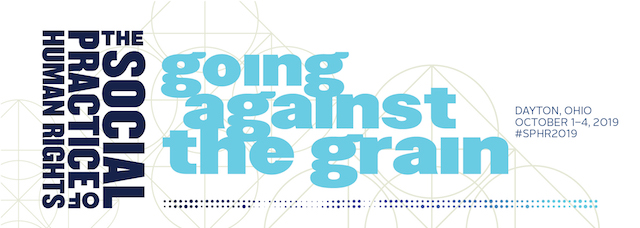Location
Paradigm Shifts: Migrant and Refugee Rights
Start Date
10-3-2019 11:00 AM
End Date
10-3-2019 12:30 PM
Keywords
asylum, migration, risk, rescue, Mediterranean
Abstract
Over the course of Europe’s recent refugee crisis, the role of Search and Rescue (SAR) has changed dramatically, first forming a critical part of (inter)national responses to the crisis, and now occupying an antagonistic position, as countries have closed their ports to NGO-operated vessels and the European Commission (EC) has ceased naval Search and Rescue operations. As a result, migrants crossing the Central Mediterranean face different and increased risks, including dying at sea, being held by European authorities, or being apprehended closer to Libya and sent to a Libyan detention camp.
In response to these shifts, groups that continue SAR operations without guaranteed government support have become more overtly activist in nature. This change is exemplified in the work of the group Mediterranea, in which activists, humanitarian workers, and scholars maintain the rescue ship Mare Jonio, working at sea to bring migrants to safety, and via social media to garner support for their cause.
In this talk, through the example of Mediterranea, I ask: How does a reading of risk, understood from the perspectives of different institutional and individual subjects, inform understandings of how notions of rescue and human rights are changing in contexts of precarious migration? I consider how structural changes in border management affect the dynamics of risk engaged by different actors in borderzones, including migrants, humanitarian workers, and border authorities. My focus on social and political transformations through the lens of risk also draws on my ethnographic and narrative-based research with migrants and aid workers in Italy.
Author/Speaker Biographical Statement(s)
Eleanor Paynter is a PhD Candidate in Comparative Studies at Ohio State University. Her scholarly work focuses on migration, asylum, borders, and their representation in life narrative, with particular attention to contemporary Mediterranean migration to Italy. Eleanor is a co-founder of OSU’s Migration Studies Working Group, and her articles have appeared in the European Journal of Life Writing, a/b: auto/biography, and Contexts. Her dissertation project investigates discourses and experiences of emergency in the context of precarious migration to Italy, analyzing oral history interviews and written and filmic narratives.
Included in
Migration Studies Commons, Other International and Area Studies Commons, Race, Ethnicity and Post-Colonial Studies Commons, Social and Cultural Anthropology Commons
Risking Rescue: The Politics of Precarity in Mediterranean Crossing
Paradigm Shifts: Migrant and Refugee Rights
Over the course of Europe’s recent refugee crisis, the role of Search and Rescue (SAR) has changed dramatically, first forming a critical part of (inter)national responses to the crisis, and now occupying an antagonistic position, as countries have closed their ports to NGO-operated vessels and the European Commission (EC) has ceased naval Search and Rescue operations. As a result, migrants crossing the Central Mediterranean face different and increased risks, including dying at sea, being held by European authorities, or being apprehended closer to Libya and sent to a Libyan detention camp.
In response to these shifts, groups that continue SAR operations without guaranteed government support have become more overtly activist in nature. This change is exemplified in the work of the group Mediterranea, in which activists, humanitarian workers, and scholars maintain the rescue ship Mare Jonio, working at sea to bring migrants to safety, and via social media to garner support for their cause.
In this talk, through the example of Mediterranea, I ask: How does a reading of risk, understood from the perspectives of different institutional and individual subjects, inform understandings of how notions of rescue and human rights are changing in contexts of precarious migration? I consider how structural changes in border management affect the dynamics of risk engaged by different actors in borderzones, including migrants, humanitarian workers, and border authorities. My focus on social and political transformations through the lens of risk also draws on my ethnographic and narrative-based research with migrants and aid workers in Italy.




Comments
@ebpaynter
www.eleanorbpaynter.net